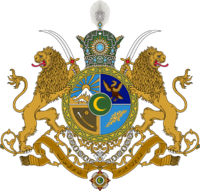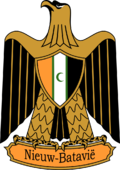Treaty between Çakaristan and New Batavia
The Treaty of friendship and cooperation between the Çakar Empire and the Islamic Republic of New Batavia was signed in Madinat Al-Mariyah on 5.V.1722 AN by Dervish Çelebi, Grand Vizier, for Çakaristan, and Rania Lucius, Grand Vizier for New Batavia.
At the signing ceremony, President Sulayman Salem was presented the Order of Çakar, First Class. Shahanshah Jaaguzan was presented the Badge of Honor of New Batavia, First Class in return.
Text
| English | Dutch |
|---|---|
TREATY OF FRIENDSHIP AND COOPERATION BETWEEN THE ÇAKAR EMPIRE AND THE ISLAMIC REPUBLIC OF NEW BATAVIA
and His Excellency, Sulayman Salem, President of New Batavia desire for a diplomatic relationship and good understanding between them, underpinning further friendship between their respective countries, have agreed to the following articles of agreement:Article I – Peace and friendship Article II - Sovereignty and territorial integrity Article III - Airspace Article IV – Diplomatic mission The High Contracting Parties will make an embassy available for each other. For the embassy, associated grounds, associated vehicles, leading statesmen, visits by official delegations, special envoys of the governments and ambassadors, diplomatic immunity applies. Each High Contracting party recognizes and respects the procedures of acceptance by the ambassador, by handing over a letter of credence, which is addressed from one head of state to the other asking to give credence. Article V - Recognition of bureaucracy Article VI - Interpretation Article VII - Ratification Article VIII - Repeal Signed on 20.V.1722 AN at Madinat Al-Mariyah: For the Çakar Empire:
|
VERDRAG VAN VRIENDSCHAP EN SAMENWERKING TUSSEN HET TJAKAR RIJK EN DE ISLAMITISCHE REPUBLIEK NIEUW-BATAVIË
En Zijne Excellentie, Sulayman Salem, President van Nieuw-Batavië verlangen diplomatieke relaties en goede verstandhouding tussen hen ter ondersteuning van verdere vriendschap tussen hun respectieve landen, zijn deze verdragsartikelen overeen gekomen: Artikel I - Vrede en vriendschap Er zullen een stabiele en voortdurende vrede en vriendschappelijke betrekkingen zijn tussen Zijne Majesteit, de Shahanshah van Tjakaristan en Zijne Excellentie, de President van Nieuw-Batavië, tussen hun erfgenamen of opvolgers, en tussen het Tjakar Rijk en de Islamitische Republiek van Nieuw-Batavië, in dit verdrag de Hoge Verdragsluitende Partijen genoemd, en tussen hun burgers, zonder onderscheid. Artikel II - Soevereiniteit en territoriale integriteit Elke Hoge Verdragsluitende Partij eerbiedigt de onafhankelijkheid, soevereiniteit en territoriale integriteit van de andere partij. De Hoge Verdragsluitende Partijen zullen bestaande betrekkingen van oprechte vriendschap, goed nabuurschap en alomvattende samenwerking blijven ontwikkelen en consolideren op basis van de bovengenoemde beginselen, evenals die van gelijkheid en wederzijds voordeel. Artikel III - Luchtruim De Hoge Verdragsluitende Partijen komen overeen het Verdrag inzake de Burgerluchtvaart van de Micras Verdragsorganisatie binnen twee Norton-jaren na de ratificatie van dit verdrag te ondertekenen en te ratificeren. Artikel IV - Diplomatie De Hoge Verdragsluitende Partijen zullen regelmatig contact met elkaar onderhouden over belangrijke internationale problemen die de belangen hun beider landen en regeringen raken, door middel van bijeenkomsten en formele toppen tussen hun staats- en regeringsleiders, bezoeken van officiële delegaties en speciale gezanten van de regeringen, en via diplomatieke kanalen. De Hoge Verdragsluitende Partijen stellen aan elkaar een ambassade ter beschikking. Voor de ambassade, bijbehorende terreinen, bijbehorende voertuigen, vooraanstaande staatslieden, bezoeken van officiële delegaties, speciale gezanten van de regeringen en ambassadeurs geldt diplomatieke onschendbaarheid. Elke Hoge Verdragsluitende Partij erkent en respecteert de procedures van aanvaarding door de ambassadeur, door een geloofsbrief te overhandigen, die van het ene staatshoofd aan het andere wordt gericht. Artikel V - Erkenning van bureaucratie Elke Hoge Verdragsluitende Partij geeft de andere het volle vertrouwen en erkenning voor alle openbare handelingen, documenten, contracten en gerechtelijke procedures op het gebied van het burgerlijk recht, met inbegrip van documenten over huwelijk, eigendom, titels, overlijden en erfenis, voor zover elke handeling of document gebeurt volgens wettelijke voorschriften. Artikel VI - Interpretatie Elk verschil in interpretatie van een artikel of artikelen van dit verdrag dat tussen de Hoge Verdragsluitende Partijen zou kunnen ontstaan, zal bilateraal worden opgelost met vreedzame middelen in een geest van wederzijds respect en begrip. Artikel VII - Bekrachtiging Dit verdrag treedt in werking na ondertekening en bekrachtiging door beide Hoge Verdragsluitende Partijen in overeenstemming met hun respectieve nationale procedures. Artikel VIII - Opzeg Elke Hoge Verdragsluitende Partij kan dit verdrag opzeg op voorwaarde van een opzegtermijn van één Nortonjaar. Ondertekend op 20.V.1722 AN in Madinat Al-Mariyah: Voor het Tjakar Rijk:
|

